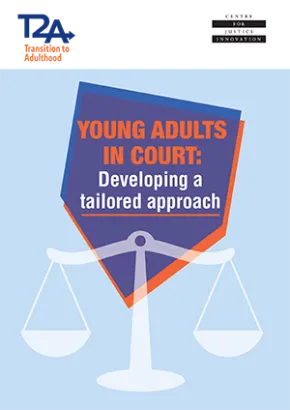Young people in their late teens and early twenties are still growing into full adulthood. But the justice system makes no distinction between a defendant who is 18 and one who is 58. The criminal justice system, and especially criminal courts, should take an approach to working with young adults which acknowledges their different needs. We are working with five sites in England and Wales to trial this distinctive approach at specialised sittings, with the support of the Barrow Cadbury Trust through its Transition to Adulthood Alliance.
Research on brain development has suggested that young people’s impulse control, reasoning and decision-making capabilities are in formation as late as their mid-twenties. But once young people reach the age of 18, the criminal justice system treats them as though they were fully adult.
If the criminal justice system adopts an approach which takes account of the developmental maturity and particular needs of young adults, it can make them far more likely to ‘grow out of crime’.
Young adults have different needs
Young adults in their late teens and early 20s are a distinct group, both physically and socially. Recent research that they think differently to older people: they are more open to external influences, both positive and negative, and that the brains of many young adults are still developing. And today, they live at home and are dependent on their families for longer than they were in the past.
All this implies that they have different needs to older people. And this is especially true of young adults in the criminal justice system. Young people in the justice system are more likely than older people to be unemployed on arrest, and have very high levels of illiteracy. Imprisoned young people are more likely to have severe mental health issues, have higher rates of suicide and self-harm and are more likely to have been in care.
Developing a tailored approach: a feasibility study
This paper sets out a plan for designing innovations that may improve outcomes for young adults in court, develop with support from the Barrow Cadbury Trust through their Transition to Adulthood Alliance. Our report explores the feasibility of establishing specialist court sittings for young adults. It lays out the evidence for young people’s distinctive needs and suggests ways in which courts can respond to them.
By doing things like cutting down on the use of jargon, doing more to involve families and giving young people a voice in court, we are hoping to improve their experience and reduce the chance that they will reoffend.
Following the report, we are not working with partners in five areas in England and Wales who are interested in exploring new approaches to young adults in their courts. By working with them to assess local needs and strengths, we will identify options for sites to develop, deliver and test.
